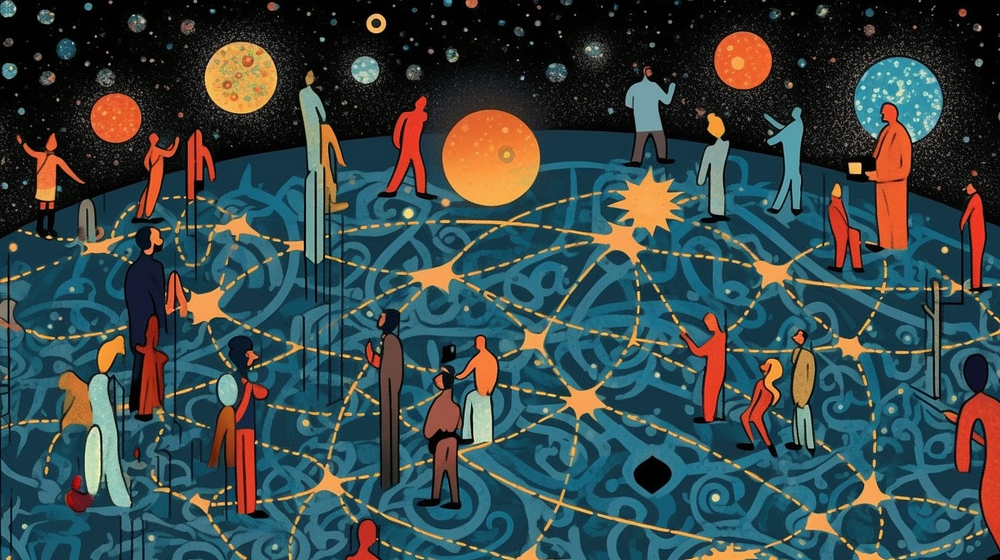The world of cryptocurrency, once a niche domain occupied by a few tech enthusiasts, has burgeoned into a global phenomenon in the last decade. More than just an investment trend, cryptocurrencies embody a revolution in the way we perceive and handle money, raising critical questions about individual freedom, centralization of power, and the future of our global order. As we stand on the precipice of change, the next decade holds immense transformative potential that could redefine our societies in ways we have never before imagined.
The Transformative Potential of Blockchain Technologies
The digital era has ushered in a convergence of trends and technologies, with blockchain at the helm, that are poised to redefine our world. The power of these tools extends far beyond mere financial transactions, promising to transform how governments operate, how power is distributed, and how individuals shape their own lives.
The Covid-19 pandemic, a global crisis, catalyzed the shift towards digital solutions. Amidst lockdowns and safety restrictions, we witnessed a sudden transition from a free society to a confined digital world, underscoring the rapid pace at which global change can occur. This transition acted as a tipping point, driving home the reality of how quickly our conventional norms can be turned on their heads.
Further fuelling this transformation is the advent of generative AI and the rise of transnational agreements. The former is revolutionizing technology, creating intelligent systems that can learn, adapt, and even create, while the latter is reshaping the political landscape, giving rise to an era where nation-states may no longer have sole sovereignty over their citizens.
The Threat to Individual Freedom

However, as we march towards this new digital frontier, threats to our individual freedom loom large. Central to this concern are Central Bank Digital Currencies (CBDCs). Touted as a tool for greater efficiency and the potential eradication of cash, the reality of CBDCs is far more complex and potentially more insidious.
These digital currencies aren’t merely about transforming our financial systems; they could allow control over what you’re allowed to spend your money on to fall into the hands of people you’ve never met, and who are unaccountable to any legislative process. Imagine a world where, if you’ve already filled your gas tank this week, you’re barred from doing it again until the following week, not by your own budget constraints, but by an invisible hand of bureaucracy.
Beyond monetary control, the threat extends to a broader array of personal freedoms. It gives rise to a reality where your activities can be curtailed, not based on legal laws, but on their alignment with some intangible ‘social benefit’ or a particular bureaucratic agenda.
This is no longer a dystopian conjecture but a system being realized today, exemplified by China’s social credit system, an initiative that monitors and regulates the behavior of its 1.5 billion citizens. Such a system underscores the potential for technology to be wielded as a tool of control, and prompts urgent questions about the kind of future we want to shape.
The Importance of Decentralization

For centuries, societies have operated under centralized systems, where governments and corporations control the flow of money and the structures of identity. Today, however, the rise of blockchain technologies is driving a powerful counter-narrative to these old systems, opening new avenues for individuals to regain control of their economic and personal lives.
This quest for decentralization is not just a technological change; it’s a deeply philosophical one. The change posits that we should not accept out of convenience or fear that someone we’ve never met or who doesn’t even live in our country should have more control over our lives than we do. The move to decentralized systems marks a significant shift in societal thinking, echoing the age of Enlightenment where the flow of information became democratized.
However, with such monumental change comes the potential for both promise and peril. Will decentralization lead to a Utopia, an enlightened world where individuals enjoy unprecedented control over their money, identity, and ultimately, their lives? Or will it lead to a dystopian hell where the lack of traditional structures leads to chaos and exploitation? The answer to this question lies not just in the technology behind decentralization but in how we, as a society, choose to wield it.
The Role of Cryptocurrency
The burgeoning cryptocurrency industry is at the forefront of this decentralization movement. It’s not just about generating wealth; it’s about embracing an entirely new way of thinking about money, identity, and freedom. Cryptocurrencies, like Bitcoin, Ethereum, and Cardano, to name a few, offer a tantalizing glimpse of a future where we are the sole owners of our financial assets.
Cryptocurrencies, underpinned by blockchain technology, promote economic empowerment by enabling peer-to-peer transactions without the need for traditional intermediaries such as banks or governments. Furthermore, they offer a potent symbol of financial sovereignty and represent the passion, enthusiasm, and commitment of millions of individuals who have chosen to devote their lives to the quest for freedom.
The rise of the cryptocurrency industry over the past 13 years, attracting millions of people and trillions of dollars, represents an undeniable shift in the global economic order. This shift could potentially lead to a future where decentralized identities (DIDs) are the norm, and individuals control the keys to their identity, not governments or corporations.
The Challenges Ahead

However, the road to a fully decentralized future is not without its obstacles. The existing global order, built over centuries, is not about to be uprooted easily. We face powerful forces resistant to change, be it corporate, government, or other transnational bodies. These entities may have their vested interests, political agendas, and policies that hinder the progress of decentralization.
Moreover, the progress of cryptocurrency and blockchain technology has invited scrutiny, regulations, and even rejection from parts of the traditional financial system. Challenges like regulatory chokepoints, accounts being rejected by banks, and increasing scrutiny on whether every digital asset should be treated as a security represent significant obstacles to the mainstream adoption of cryptocurrencies.
However, despite these challenges, the growth and resilience of the crypto ecosystem remain robust. Its ability to withstand these trials is a testament to the decentralized, resilient living organism that it is, always striving to improve and push the boundaries of what’s possible.
The Role of Cardano and other Cryptocurrencies
In the fight for decentralization, the role of cryptocurrencies like Cardano is significant. These digital assets are not just a means of value transfer, but a symbol of the power of decentralization and a testament to the promise of a more equitable and inclusive global economic system.
The strength of the cryptocurrency industry comes from its collaborative nature. The open-source ethos of projects like Cardano ensures that the collective knowledge and expertise of the global community are harnessed to fuel innovation. This collaborative framework not only strengthens the industry’s resilience but also fuels its growth and evolution.
Looking forward, the vision for cryptocurrencies extends beyond financial transactions. The potential of blockchain technology to redefine identity, ownership, and power is immense. In the future, we envision a world where our identities are owned and controlled by us, not by corporations or governments. A world where the value we own is not an IOU from an organization but a tangible digital asset in our possession. A world where power is truly decentralized.
The Importance of Resilience and Unity
The journey towards decentralization has not been an easy one. As in any significant movement in human history, resilience in the face of adversity is critical. We must take inspiration from our collective past where resilience and unity were key to overcoming challenges and driving change.
This crypto revolution is not a solitary endeavor. It requires the collective effort of millions of people across the globe, each playing their part in this gargantuan, decentralized living organism. Every individual, whether they are developing protocols or investing in digital currencies, contributes to this shared vision of a decentralized future.
The call for ongoing participation and engagement in this collective movement is vital. The success of this movement depends on our collective resilience and unity. In this struggle, every voice matters, and every action contributes to our shared vision of a freer and more decentralized world.
Why we Fight
As we navigate the evolving landscape of the 21st century, the importance of individual rights and control over one’s identity, money, and voice cannot be understated. The fight for decentralization is not merely a fight for a new form of digital currency, but a fight for a new social, political, and economic order that values individual sovereignty above all.
Our collective efforts are the heartbeat of this movement. As such, it is crucial for each one of us to continue supporting and fighting for the principles of decentralization. Whether you’re developing protocols, investing in cryptocurrencies, or simply educating yourself and others about blockchain technology, you are contributing to this seismic shift.
Finally, our journey toward a more equitable future is bound by a shared belief in the potential of technology to democratize power. As we continue to navigate the challenges and victories ahead, we do so with the knowledge that we are part of a collective, committed to improving not just our own lives, but those of future generations.
Every human being on this planet, no matter where they’re born or who they’re born to, deserves equality, autonomy, and a voice. This belief fuels our journey towards a decentralized future and binds us together in a collective movement that is reshaping the world as we know it.
Remember, we’re all in this together. The future of our world is bright, and the best is yet to come. Onwards to a future where every person has control over their identity, their wealth, and their voice. Onwards to a future of decentralization.










